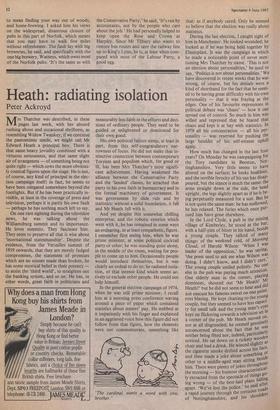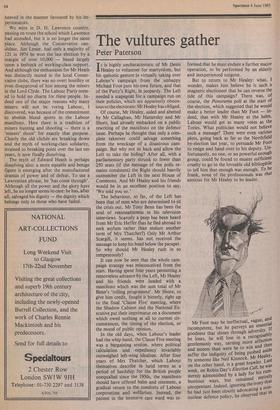Heath: radiating isolation
Peter Ackroyd
Mrs Thatcher was described, in these pages last week, with her absurd rushing about and occasional shrillness, as resembling Widow Twankey; if we continue the pantomimic simile, we might call Mr Edward Heath a principal boy. There is that same heavy joviality combined with a virtuous seriousness, and that same slight air of strangeness — of something being not quite right — which cows the more obvious- ly comical figures upon the stage. He is not, of course, any kind of principal in the elec- tion campaign itself; in fact, he seems to have been relegated somewhere beyond the footlights. But if he has been practically in- visible, at least in the coverage of press and television, perhaps it is partly his own fault — perhaps he has nothing much left to say.
On one rare sighting during the television news, he was talking about the Williamsburg summit and its importance. He loves summits. They fascinate him. They seem to preserve all that is wise about 'international statesmanship'. Despite the evidence, from the Versailles summit of 1919 onwards, that they are merely fudged compromises, the statement of promises which are no sooner made than broken, he has some mystical belief in their potency to assist the 'third world', to straighten out the banking system, and so on. He has, in other words, great faith in politicians and measurably less faith in the efforts and deci- sions of ordinary people. They need to be guided or enlightened or dominated for their own good.
His own political failure stems, at least in part, from this self-congratulatory nar- rowness of focus. He did not make that in- stinctive connection between contemporary Toryism and populism which, for good or ill, has been Mrs Thatcher's most signifi- cant achievement. Having weakened the alliance between the Conservative Party and the 'landed' classes, he attached that party to his own faith in bureaucracy and in the formal machinery of government. It was government by slide rule and by statistics: without a solid foundation, it fell and Mr Heath fell with it.
And yet despite this somewhat chilling enterprise, and the robotic exterior which went with it, he has remained in some ways an endearing, or at least sympathetic, figure. I remember first seeing him, when he was prime minister, at some political cocktail party or other; he was standing quite alone, in the middle of the room, waiting for peo- ple to come up to him. Occasionally people would introduce themselves, but it was clearly an ordeal to do so: he radiated isola- tion, of that intense kind which seems ac- tively to exclude other people. He could not help himself.
In the general election campaign of 1974, when he was still prime minister, I recall him at a morning press conference waving around a piece of paper which contained statistics about miners' pay. He stabbed at it impatiently with his finger and explained in an aggrieved voice how this figure did not follow from that figure, how the elements were not commensurate, something like
The cardinal wants a word with you, brother.'
that: as if anybody cared. Only he seemed to believe that the election was really about statistics.
During the last election, I caught sight of him in Manchester. He looked wounded; he looked as if he was being held together by Elastoplast. It was the campaign in which he made a noticeable point of never men- tioning Mrs Thatcher by name. 'This is not an election about personalities,' he used to say, 'Politics is not about personalities.' We have discovered in recent weeks that he was wrong, of course, but his denials were a kind of shorthand for the fact that he seem- ed to be having great difficulty with his own personality — that it was fraying at the edges. One of his favourite expressions in political debate was 'chaos' — how it can spread out of control. So much in him was willed and repressed that he feared that chaos and kept it at bay with statistics. In 1979 all his concentration — all his per- sonality — was reserved for pushing the large boulder of his self-esteem uphill again.
How much has changed in the last four years? On Monday he was campaigning for the Tory candidate in Beeston, Not- tinghamshire. Very little seems to have altered on the surface; he looks healthier, and the terrible ferocity of his tan has disap- peared, but the stance is much the same: the arms straight down at the side, the head upright, the legs slightly apart as if he is be- ing perpetually measured for a suit. But he is not quite the same man: he has mellowed, he has relaxed. The furies which once pur- sued him have gone elsewhere. In the Lord Clyde, a pub in the mining village of Kimberley, he stood at the bar, with a half-pint of bitter in his hand, beside a young couple. They talked of many things: of the weekend cold, of Morning Cloud, of Harold Wilson: 'When I was leader of the opposition,' he was sayings 'the press used to ask me what Wilson was doing. I didn't know, and I didn't care. The young couple smiled politely. No one else in the pub was paying much attention. One elderly man in the corner, playing dominoes, shouted out `Mr Heath! Mr Heath!' but he did not seem to hear and did not execute his famous swivel on one point. eyes blazing. He kept chatting to the young couple, but they seemed to have less capaci- ty for small talk and the young man's eyes kept on flickering towards a television set in a corner of the pub. Mr Heath moved on, not at all disgruntled; he seemed genuinelY unconcerned about the fact that he Was neither being feted nor, indeed, particularly noticed. He sat down on a rickety wooden chair and had a drink. He winced slightly as the cigarette smoke drifted across his face, and then made a joke about some d.e other to a middle-aged man sitting him. There were plenty of jokes throughout _ the morning — his humour characteristical- ly extracted from the spectacle of thingsi ng go- ing wrong — of the best-laid plans falling apart. 'We've lost the police,' he said after ,s a rapid journey through the tortuous riodedrs of Nottinghamshire, and his shou
heaved in the manner favoured by his im- personators.
We were in D. H. Lawrence country, passing en route the school which Lawrence had attended, but it is no longer the same place. Although the Conservative can- didate, Jim Lester, had only a majority of 121 in 1974 he won the last election by a margin of over 10,000 — based largely upon a bedrock of working-class support. And although the enthusiasm for Mr Heath was distinctly muted in the local Conser- vative clubs, there was no overt hostility or even disapproval of him among the miners in the Lord Clyde. The Labour Party seem- ed to hold no charm for these people. In- deed one of the major reasons why many miners will not be voting Labour, 1 discovered, was because of the commitment to abolish blood sports in the Labour manifesto. Here there is a tradition of miners hunting and shooting — there is a 'miners' shoot' for exactly that purpose. Clearly the old cliches are breaking down and the myth of working-class solidarity, strained to breaking point over the last ten years, is now finally dissolving.
The myth of Edward Heath is perhaps dissolving also: a more equable and benign figure is emerging after the manufactured dramas of power and of defeat. To use a Lawrentian phrase, he 'has come through'. Although all the power and the glory have left, he no longer seems to care: he has, after all, salvaged his dignity — the dignity which belongs only to those who have failed.















































 Previous page
Previous page